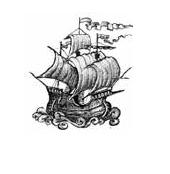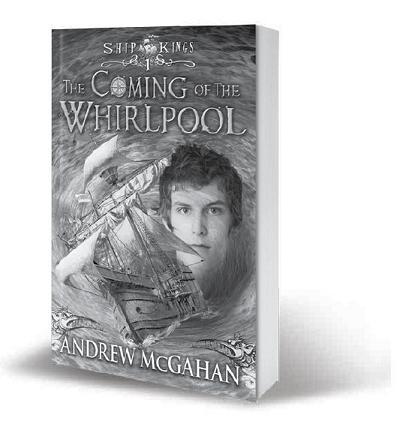The Voyage of the Unquiet Ice (45 page)

The
Twelfth Kingdom
was being abandoned.
Dow watched, dispassionate now. Most of those leaping overboard would survive, he thought. The seas were calm and warm, and vessels of the Ship Kings fleet, having finished with the battle, were already converging upon the disaster, launching boats to rescue those in the water. And that was good, for Dow wished no special harm to the great ship's crew; not the common seaman and gunners and palace servants.
He wasn't so sure, however, about the kings and dignitaries of the Lords of the Fleet â at least, not Carrasco and Ferdinand and their like. Had they still been on board when the attack began? Had Diego? It was viciously pleasant to think that they might all be trapped now by the destruction. But Dow knew it was unlikely. The
Twelfth
Kingdom
was beyond saving maybe, but it was vast still, and could not burn all in an instant â its forward half was as yet untouched by flame. Most who wanted to escape would surely have the time to do so.
But what of Ibanez?
The Sea Lord had vowed that he would not abandon his ship. Dow lifted his gaze to the palace. It stood proud and tall and unburnt yet, its great brazen dome flaring golden and orange in the terrible light. An image came to Dow, of the old man climbing slowly up through the many stories of his fortress, to reach the uppermost chamber beneath the dome, his private audience, where he'd sat with Vincente and Dow, months before.
But the windows that had then all been closed would be open now, displaying the ocean as it reached away in every direction, and Ibanez would turn from window to window, from south to east to north to west and back to the south again â the direction in which his lost son had sailed â contemplating one last time the empire that was, or had been, his. But then flames would begin to lick at the glass, and smoke to obscure the view, and from below would come a great groaning as fires ate at vast supporting timbers. Ibanez would stand calmly and regally, nonetheless, of that Dow was sure. But in the end he, and the dome, would fall in ruin.
Dow came back to himself. Smoke was thickening in the lower airs now, and the capital ship was only a giant shadow through the haze, a black mountain that roared with a red leaping glow.
He turned away. He and Johannes and Nicky had their own survival to think of. An ashy slick was spreading about the boat, and wreckage floated everywhere, but forward over the bow the air was clearer, and dawn was growing in the sky. Dow could see that the Twin Island ships were gathering into an ordered fleet once more, a mile perhaps off to the west, lifting the last of their now ram-less boats back on board. He steered a course directly for them. As soon as the ships were in range Johannes had only to call and identify himself, then he and Dow and Nicky would be likewise lifted to safety.
And then �
Yes, what
then
? What had taken place here this morning? Had they
won
, the Twin Islanders? And won what?
Dow looked back to the pyre of the
Twelfth
Kingdom,
and the rescuers circling mournfully about it. The Twin Islanders had certainly scored a great victory, to destroy the capital vessel. And yet, for all its size and splendour, the
Twelfth Kingdom
was but a single craft. It was not, in itself, the Ship Kings empire, nor the source of their power. That power lay in their fleets, in their several
hundreds
of ships, and by Dow's count only a fraction of those had been here today. Most indeed remained berthed in their home ports, forbidden â by very order of the new regime â from attending the Lords council.
And of those vessels in the actual battle, the Twin Islanders had sunk many, to be sure â but they had lost just as many themselves. And while the Ship Kings had whole armadas still in reserve, what of the Twin Islanders? Dow could not imagine how they had constructed their secret fleet in the first place â when the Ship Kings ruled and watched everywhere â but did they have yet more ships hidden somewhere? Did they have enough to fight the deadly conflict that must now follow? For the Ship Kings would be furious beyond reason at their loss, and they would not rest until it was avenged.
No, Dow decided, a battle had been won here, but no more than a battle. The greater struggle had only just begun.
He turned forward again. The Twin Island fleet was nearer now. Johannes was shouting to them, and waving his arm.
Dow sighed, almost in puzzlement. It was as Nell had said; fate had chosen yet again that he should live, despite being destined for death. For a second time he had been plucked from imprisonment by an attack upon his captors, first in Stone Port, and now here â and both times it was the Twin Islanders who had saved him. Unwittingly, he was sure, for in neither case could they have known anything particular of him or his plight.
So what would they do with him now? Johannes would doubtless speak up for him; nevertheless, it was an unknown. They might not look fondly upon New Islanders. After all, they had made their first attack not upon the Ship Kings, but upon the hapless folk of Stone Port and Lonsmouth. Why had that been? Had they not cared about the innocent dead?
Dow supposed he would learn the truth soon enough. Ahead, the Twin Island fleet had seen them, and one of the strange boats was now slicing its way towards them to investigate, the men on its deck staring in curiosity.
That was another question â how did these amazing craft work? And how could they be made of iron, when Commander Fidel had said that iron could never survive in salt water? But those answers, too, Dow knew, would come in time. Right now he was almost too tired and numbed with shock to care.
Johannes and Nicky had stopped rowing. They drifted, waiting the last short while for the boat to reach them. The blacksmith and his apprentice were now staring back at the fiery mass that was the
Twelfth Kingdom
, chatting animatedly about its destruction, but Dow in his weariness found his gaze drifting to the sky above. A pale patch of blue had opened there, achingly clear and pure compared to the fire and smoke all about, and he stared into it hungrily, craving its emptiness.
Then he saw a speck of white, circling against the blue, high, high up â a shape with wings outspread, tiny because it was so high, but moving with the majesty of immense size and strength, wheeling in great arcs back and forth, lit white by a sunrise that had not yet reached the sea below. Dow had no way to be sure, but he was sure nonetheless; the white bird was no ordinary gull or tern â it was an albatross. An Ice Albatross.
It came to him then that in all the time the
Chloe
had voyaged in the frozen north, they had sighted not a single Ice Albatross, even though the north was supposedly their home. There had been no sign of their nests anywhere upon Trap Island, or amid the rolling bergs, or upon the ramparts of the Ice Wall â or even on the warm slopes of the volcano, there at the very pole. Indeed, in those last uttermost climes there had been no life at all.
So where did the great birds land, he wondered, if it was nowhere upon the Four Isles, nor anywhere in the north? Where else was there?
Nowhere but the unseen southern hemisphere â¦
Dow thought of Nadal then, and the whole sad tale of the lost fleet. And once again he tasted in his heart the longing that must have driven the Lord Designate to attempt a crossing of the Doldrums.
There
must
be lands waiting there beyond the Barrier, to be discovered and explored. And they would be virgin lands, empty of human life. Vincente had once theorised that there might be men and cities already in the south, and that perhaps the mysterious boat had come from there. But Dow knew now that wasn't so â the boats came not from the south, but from the Twin Isles after all. And so in his vision the southern lands remained uninhabited, innocent of violence and contention, and lying at peace under their strange skies.
If only they could be reached ...
Dow sighed once more. The bird had vanished, and the Twin Island boat was coming up to them now. A rhythmic thumping sound emanated from its stern, and an oily smell wafted before it.
One day, Dow thought. One day, if there were still ships left, and still men left to sail them, he might be the very one to lead such a voyage of exploration, if some means could be found to defeat the Barrier. And one day, too, somehow, he would be with Nell again. He swore it.
But first â¦
First there was a war to be fought.
Andrew McGahan is one of Australia's finest writers of fiction. His first novel,
Praise
, won the
Australian
/Vogel Literary Award in 1992. In 2004,
The White Earth
won the Miles Franklin Literary Award, the Commonwealth Writers' Prize South East Asia and South Pacific Region, the
Age
Book of the Year, and the
Courier Mail
Book of the Year Award. In 2009, Andrew was shortlisted for the Manning Clark House National Cultural Awards for his contribution to Australian Literature.
The Coming of the Whirlpool,
the first volume in the Ship Kings series, was shortlisted for the Children's Book Council Book of the Year Awards (Older Readers) and for the Indie Awards (Children's), and was a finalist in the Aurealis Awards (Children's Fiction).
Andrew lives in Melbourne.
Look out for SHIP KINGS, Book 3
THE WAR
of the
FOUR ISLES

Battle has come.
Dow must put his boyhood behind him.
But is he ready for command?
Uncover special bonus stories
and explore the world of the Ship Kings.
www.shipkings.com.au
THE ADVENTURE BEGINS...

FATE. COURAGE. DOOM. DEFIANCE.